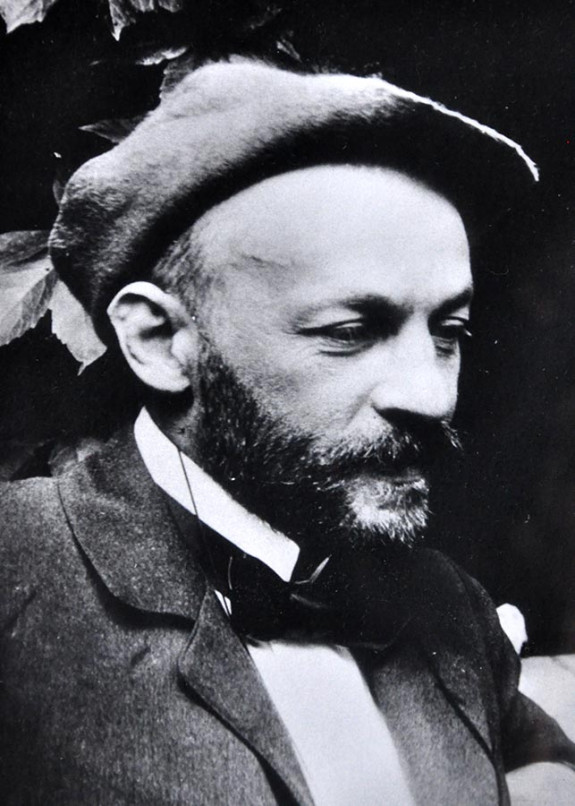A life dedicated to medieval Latin
Ludwig Traube
- * 19.6.1861 in Berlin
- ✝ 19.5.1907 in Munich
Ludwig Traube was born in the Silesian town of Ratibor (Racibórz in modern-day Poland) to a family of wine-merchants. His parents were Cora, née Marckwald, and Ludwig (Louis) Traube, a doctor for the poor and at the Jewish hospital in Berlin-Mitte. After the Prussian Jewish Emanzipation Law of 23. 7. 1847, his father was able complete his post-doctoral qualification and attained a professorship for internal medicine at the Berlin university hospital Charité, becoming a famous medical researcher. His son Ludwig, however, was critical of his use of animal experimentation, and this contributed to deepen the rift between father and son.
In 1880, at the age of 19, Ludwig Traube started studying classical philology in Munich. In 1882, he became engaged with the painter Sabine Graef (later Lepsius), with whom he collaborated in 1888 to publish the first (and only) two issues of the journal „Schauspiel und Bühne“. In 1883, he attained his Ph.D. in Munich and went on to complete his post-doctoral degree in 1888 with a study on rhythmics in Carolingian Latin poetry. In the same year, Traube’s engagement with Sabine Graef was dissolved. Instead, he ended up marrying Hildegard Hirth, the daughter of the Sinologist Friedrich Hirth, in 1901.
Ludwig Traube worked as an editor for the MGH since 1884 and was a member of the central board of directors from 1897 until 1904, when he resigned from this position after a failed attempt to install Paul von Winterfeld as his successor as the chief editor of the series Poetae. From 1899 onwards, he endeavoured to obtain a salaried position at the University of Munich, but was repeatedly turned down on account of anti-Semitic agitation. Increasingly suffering from agoraphobia, he was obliged to teach and lecture in a modified garden house located in the Seestraße near the Englischer Garten. In 1900, Ludwig Traube received an unpaid extraordinary professorship in Munich. In the following year, he turned down a position in Berlin to remain in the Bavarian capital, where he was appointed to a regular – but still unpaid – professorship after having threatened to cease teaching. Finally, in 1902 the offer of a chair in Gießen prompted the university of Munich to promise him a salaried professorship. It wasn’t until September 1 1904 that Prof. Dr Ludwig Traube received his first pay as professor ordinarius, amounting to the sum of 4560 Reichsmark annually.
Ludwig Traube saw himself principally as a scholar of medieval Latin and refused to subsume his subject under the category of classical philology. Besides studying the authors of Late Antiquity and the Middle Ages, he specifically focused on the history of medieval handwriting. Traube’s lectures were attended by an international circle of students and shaped a whole generation of manuscript researchers. Besides his scholarly competence, his friends and students valued Traube’s subtle humour and warm-heartedness.
Today, Ludwig Traube is esteemed as the founding father of the study of medieval Latin and palaeography as university subjects. His comprehensive approach to medieval sources, viewing them not just as abstract texts but in the context of their transmission, profoundly influenced the work of the MGH, making textual transmission history a central element of their critical editions.
MGH editions
- Poetae Latini aevi Carolini (III) (MGH Poetae 3), Berlin 1896
Other selected publications
- Traube, Ludwig, O Roma nobilis: Philologische Untersuchungen aus dem Mittelalter, in: Abhandlungen der königlich bayerischen Akademie der Wissenschaften, Philosophisch-Philologische und Historische Classe 19 (1891), pp. 299-395
- Traube, Ludwig, Nomina sacra. Versuch einer Geschichte der christlichen Kürzung (Quellen und Untersuchungen zur lateinischen Philologie des Mittelalters 2), München 1907
- Traube, Ludwig, Rückblick auf meine Lehrthätigkeit, hg. von Gabriel Silagi, München 1988
- Traube, Ludwig, Vorlesungen und Abhandlungen, hg. von Franz Boll, 3 Bände, München 1909-1920
Reference literature on Ludwig Traube



